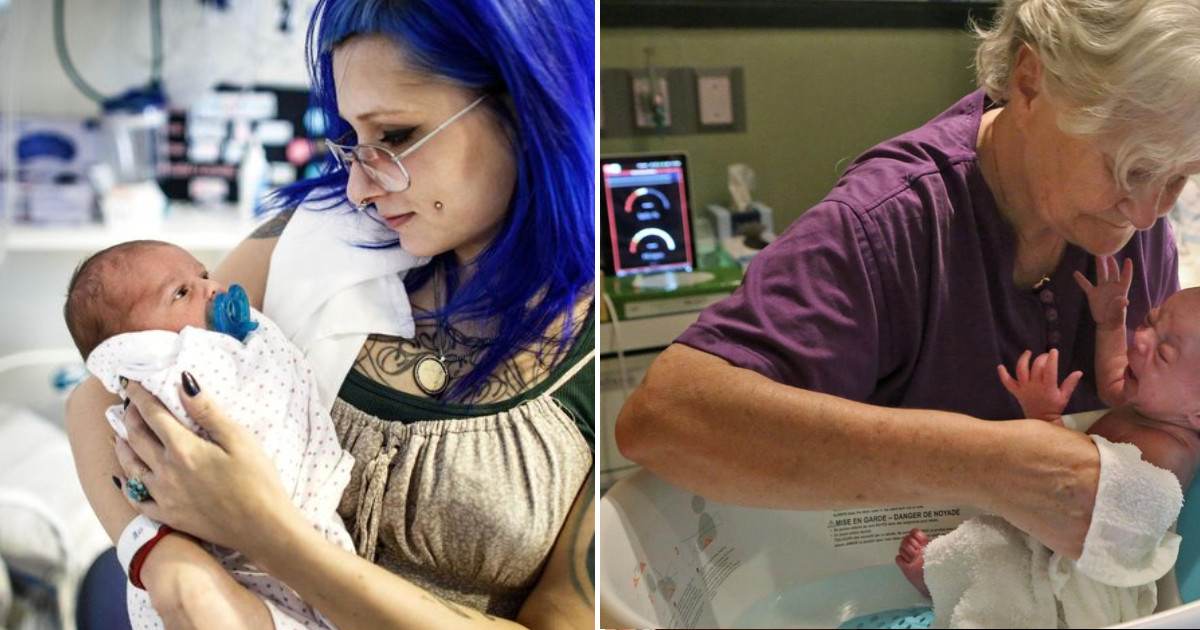
Hospitals Need Volunteers To Cuddle Babies Born Addicted To Drugs And You Can Help
Time to cuddle all the babies.

Every year just under 4 million babies are born in the United States. That's a pretty staggering statistic considering our annual death toll is only around 2 million. We are a baby booming country these days so it's only natural to assume that not everything goes as planned. What we never expected to see was a booming opioid industry and the depressing effect it's had on mothers and innocent newborn babies.
The numbers have been crunched and in the last 15 years, the number of babies born suffering from NAS (neonatal abstinence syndrome) has quadrupled. If you don't realize what that means I'll clarify. It means every 25 minutes a baby is born dealing with opioid withdrawal symptoms including pain all over and excessive shaking. They spend weeks in NICU recovering from the trauma they were born into.
 NBC News
NBC News
In some communities, the rates of babies born with NAS are 8 times higher than the national average and it's got to stop.
In Tennessee, a group of general attorneys have banded together to sue the manufacturers of opioids. Sullivan County District Attorney General Barry Staubus, a plaintiff in one of the suits, said:
Some infants are so addicted at birth that they need to be treated with morphine for weeks. The baby suffering from NAS in this photo is being administered morphine by his nurse in the NICU at Niswonger Children's Hospital.When you see those babies scream, you see them claw, you see them shake, it makes the problem real. It's not an abstract policy problem. It's not a lawsuit. It's a baby that never had a chance.
 NBC News
NBC NewsIf you're feeling helpless right now, you're not alone. Empathetic people everywhere are driven to do something for these babies but we're in no position to sue drug manufacturers or administer morphine. Fret no further, friends! Cuddle Care programs are stepping in where there is a need. The medical staff in hospitals everywhere tending to babies born suffering from NAS are understandably busy but babies born with NAS are not able to soothe themselves and almost always their parents are struggling with their own addiction and physically (and legally, usually) unable to tend to their babies' needs for snuggles and comfort.
 Shutterstock
ShutterstockJane Cavanaugh, a nurse in Pennsylvania watched the rising rates of babies born with NAS and felt compelled to do something, starting in her home town. So at Thomas Jefferson University Hospital she got the ball rolling. She told Philly.com:
Cavanaugh's team of 25 volunteers are diverse. After completing extensive background check and a four-hour training course on things like hand-washing and infection control, the volunteers spend 3 hour shifts cuddling babies under the supervision of a nurse. They don't change diapers or feed the babies. They simply attend to the need of love and compassion. Addy Schultz, 72, embraces a newborn.These babies going through withdrawal need to be held for extended periods. They need human touch. They need soothing. They need talking.
 David Swanson / Philly.com
David Swanson / Philly.com
She says:
At Magee-Womens Hospital of UPMC in Pittsburgh, Maribeth McLaughlin oversees cuddle volunteers.When he cramps up, I hold him harder and pat a little firmer. They don't like to be stroked or caressed.
 Children's Hospital Foundation
Children's Hospital FoundationShe told Today.com:
[The program] is about swaddling them and giving them that comfort and safe, secure feeling.
...We can see the reduction of the medication and often in the length of stay
Over the years countless studies have emerged proving the positive impact touch, skin to skin, and tending to an infant's desire and need for closeness have as well as proving how detrimental ignoring those things can be. Research done by at Nationwide Children’s Hospital in Ohio, states the importance of human touch on a baby’s brain development and Dr. Margot Sunderland describes how the infant brain is still being "sculpted" after birth in the first parenting book to link parent behavior with infant brain development.
 Southlake Regional Health Center
Southlake Regional Health Center
Especially since 2000 NAS rates have increased in the US by 383% (according to the Centers for Disease Control and Prevention.) With numbers like these climbing and so many wanting to help, it seems like cuddle programs are the perfect missing puzzle piece while lawmakers and politicians battle the problem head on.
How Dangerous Are Psychedelic Drugs?
Elana






